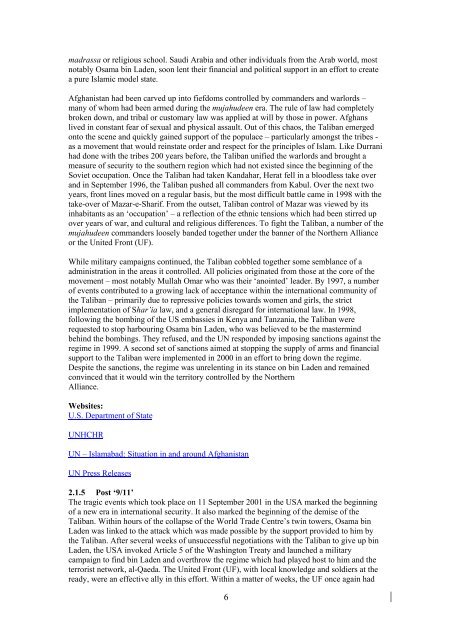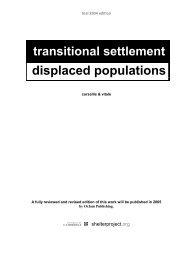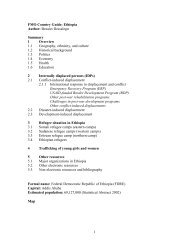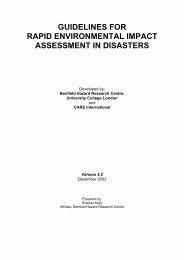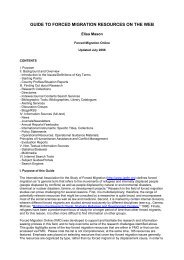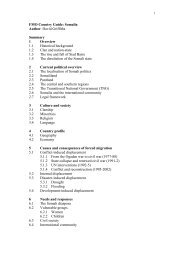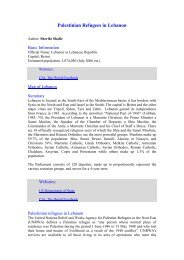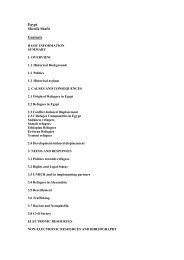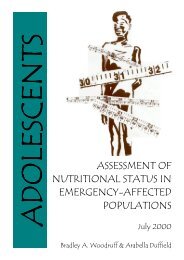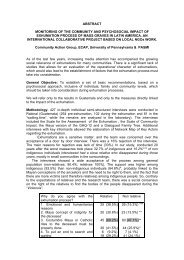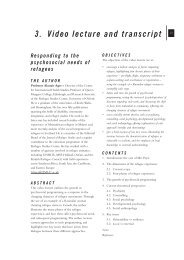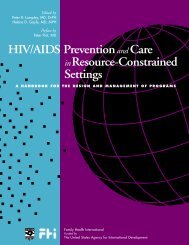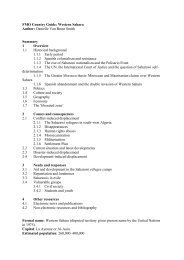Afghanistan. - Forced Migration Online
Afghanistan. - Forced Migration Online
Afghanistan. - Forced Migration Online
You also want an ePaper? Increase the reach of your titles
YUMPU automatically turns print PDFs into web optimized ePapers that Google loves.
madrassa or religious school. Saudi Arabia and other individuals from the Arab world, most<br />
notably Osama bin Laden, soon lent their financial and political support in an effort to create<br />
a pure Islamic model state.<br />
<strong>Afghanistan</strong> had been carved up into fiefdoms controlled by commanders and warlords –<br />
many of whom had been armed during the mujahudeen era. The rule of law had completely<br />
broken down, and tribal or customary law was applied at will by those in power. Afghans<br />
lived in constant fear of sexual and physical assault. Out of this chaos, the Taliban emerged<br />
onto the scene and quickly gained support of the populace – particularly amongst the tribes -<br />
as a movement that would reinstate order and respect for the principles of Islam. Like Durrani<br />
had done with the tribes 200 years before, the Taliban unified the warlords and brought a<br />
measure of security to the southern region which had not existed since the beginning of the<br />
Soviet occupation. Once the Taliban had taken Kandahar, Herat fell in a bloodless take over<br />
and in September 1996, the Taliban pushed all commanders from Kabul. Over the next two<br />
years, front lines moved on a regular basis, but the most difficult battle came in 1998 with the<br />
take-over of Mazar-e-Sharif. From the outset, Taliban control of Mazar was viewed by its<br />
inhabitants as an ‘occupation’ – a reflection of the ethnic tensions which had been stirred up<br />
over years of war, and cultural and religious differences. To fight the Taliban, a number of the<br />
mujahudeen commanders loosely banded together under the banner of the Northern Alliance<br />
or the United Front (UF).<br />
While military campaigns continued, the Taliban cobbled together some semblance of a<br />
administration in the areas it controlled. All policies originated from those at the core of the<br />
movement – most notably Mullah Omar who was their ‘anointed’ leader. By 1997, a number<br />
of events contributed to a growing lack of acceptance within the international community of<br />
the Taliban – primarily due to repressive policies towards women and girls, the strict<br />
implementation of Shar’ia law, and a general disregard for international law. In 1998,<br />
following the bombing of the US embassies in Kenya and Tanzania, the Taliban were<br />
requested to stop harbouring Osama bin Laden, who was believed to be the mastermind<br />
behind the bombings. They refused, and the UN responded by imposing sanctions against the<br />
regime in 1999. A second set of sanctions aimed at stopping the supply of arms and financial<br />
support to the Taliban were implemented in 2000 in an effort to bring down the regime.<br />
Despite the sanctions, the regime was unrelenting in its stance on bin Laden and remained<br />
convinced that it would win the territory controlled by the Northern<br />
Alliance.<br />
Websites:<br />
U.S. Department of State<br />
UNHCHR<br />
UN – Islamabad: Situation in and around <strong>Afghanistan</strong><br />
UN Press Releases<br />
2.1.5 Post ‘9/11’<br />
The tragic events which took place on 11 September 2001 in the USA marked the beginning<br />
of a new era in international security. It also marked the beginning of the demise of the<br />
Taliban. Within hours of the collapse of the World Trade Centre’s twin towers, Osama bin<br />
Laden was linked to the attack which was made possible by the support provided to him by<br />
the Taliban. After several weeks of unsuccessful negotiations with the Taliban to give up bin<br />
Laden, the USA invoked Article 5 of the Washington Treaty and launched a military<br />
campaign to find bin Laden and overthrow the regime which had played host to him and the<br />
terrorist network, al-Qaeda. The United Front (UF), with local knowledge and soldiers at the<br />
ready, were an effective ally in this effort. Within a matter of weeks, the UF once again had<br />
6


